University Assignment: Recovery Focused Mental Health Care Plan
VerifiedAdded on 2022/09/13
|14
|2750
|18
Practical Assignment
AI Summary
This document presents a comprehensive recovery-focused mental health care plan for a 27-year-old patient named Kate, admitted to an adult inpatient unit due to major depressive disorder. The plan addresses four key issues: dysfunctional grieving, disturbed thought processes, low self-esteem, and hopelessness, as identified through HONOS scoring. The plan outlines specific goals for each issue, detailing consumer and nursing interventions, the responsible parties, and the timeframe for implementation. The interventions include strategies for managing grief, improving cognitive function, enhancing self-esteem, and addressing feelings of hopelessness. The plan emphasizes a collaborative approach, involving both the patient and the nurse care manager, to facilitate recovery and promote the patient's ability to engage in self-care activities and improve her overall well-being. The document also includes references supporting the interventions and approaches used in the care plan.
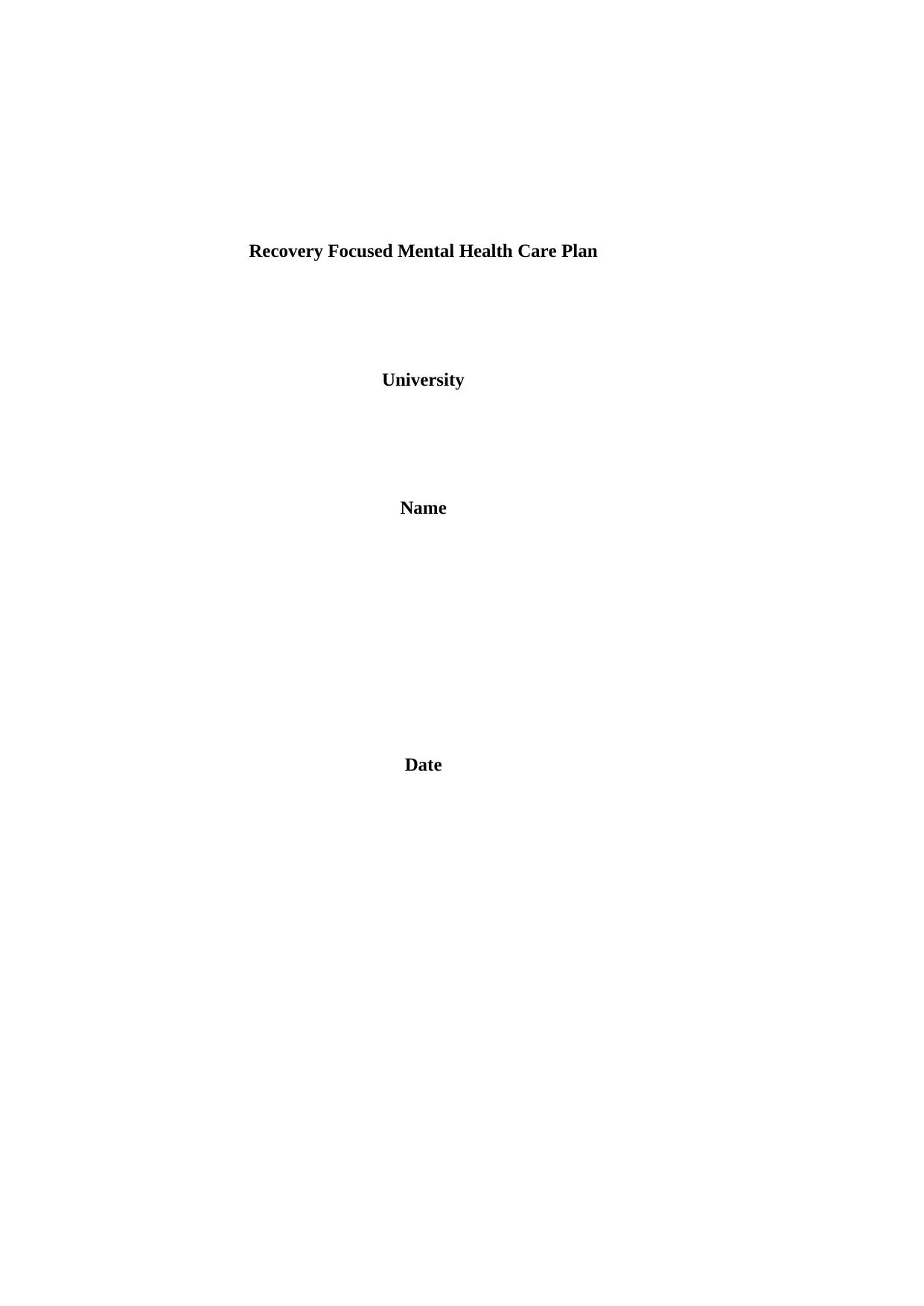
Recovery Focused Mental Health Care Plan
University
Name
Date
University
Name
Date
Paraphrase This Document
Need a fresh take? Get an instant paraphrase of this document with our AI Paraphraser

Recovery Focused Mental Health Care Plan 2
Table of Contents
Kate Case study: Client with Depression..............................................................3
HONOs Scoring.....................................................................................................3
Recovery Focussed plan........................................................................................4
References...........................................................................................................13
Table of Contents
Kate Case study: Client with Depression..............................................................3
HONOs Scoring.....................................................................................................3
Recovery Focussed plan........................................................................................4
References...........................................................................................................13
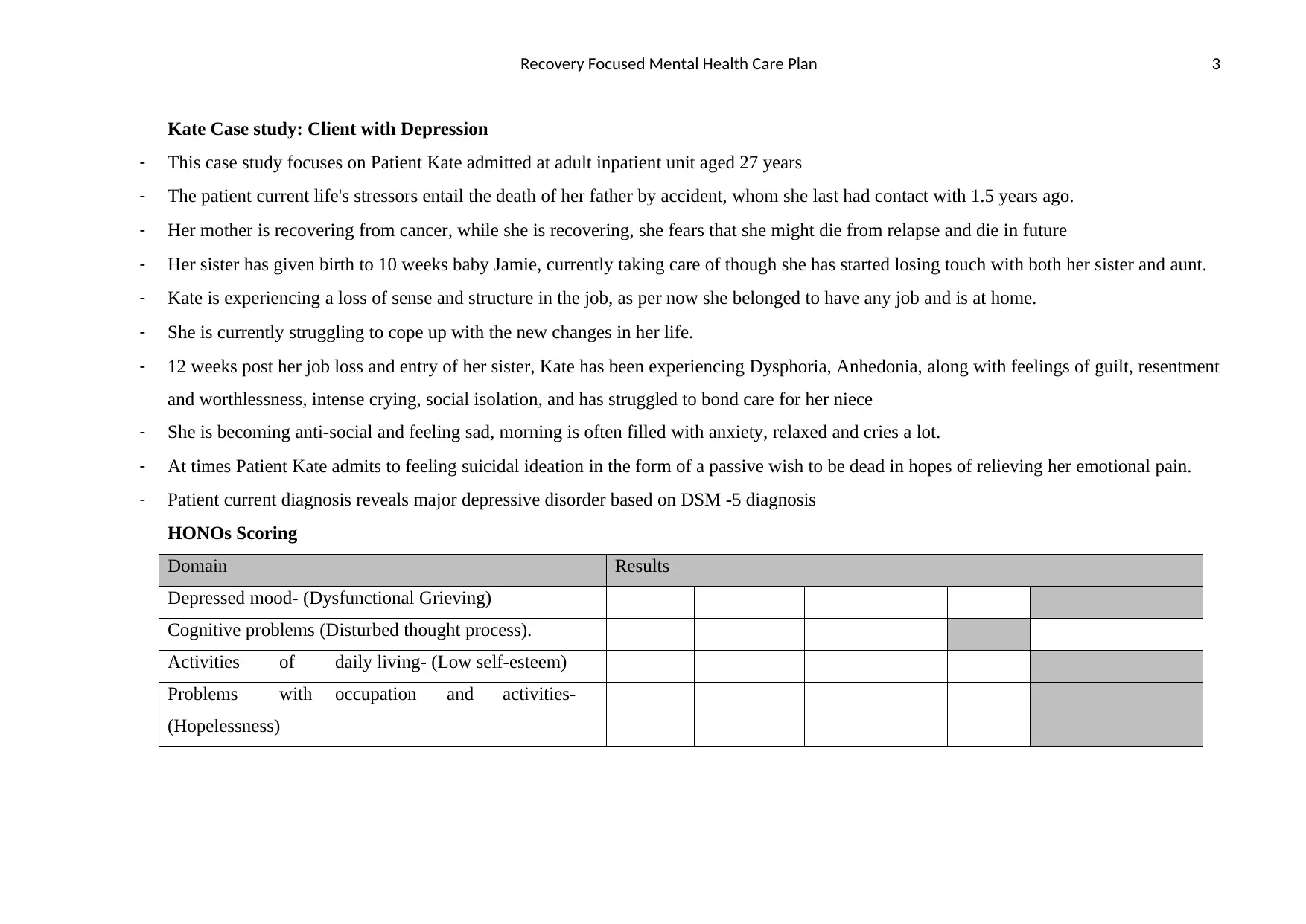
Recovery Focused Mental Health Care Plan 3
Kate Case study: Client with Depression
- This case study focuses on Patient Kate admitted at adult inpatient unit aged 27 years
- The patient current life's stressors entail the death of her father by accident, whom she last had contact with 1.5 years ago.
- Her mother is recovering from cancer, while she is recovering, she fears that she might die from relapse and die in future
- Her sister has given birth to 10 weeks baby Jamie, currently taking care of though she has started losing touch with both her sister and aunt.
- Kate is experiencing a loss of sense and structure in the job, as per now she belonged to have any job and is at home.
- She is currently struggling to cope up with the new changes in her life.
- 12 weeks post her job loss and entry of her sister, Kate has been experiencing Dysphoria, Anhedonia, along with feelings of guilt, resentment
and worthlessness, intense crying, social isolation, and has struggled to bond care for her niece
- She is becoming anti-social and feeling sad, morning is often filled with anxiety, relaxed and cries a lot.
- At times Patient Kate admits to feeling suicidal ideation in the form of a passive wish to be dead in hopes of relieving her emotional pain.
- Patient current diagnosis reveals major depressive disorder based on DSM -5 diagnosis
HONOs Scoring
Domain Results
Depressed mood- (Dysfunctional Grieving)
Cognitive problems (Disturbed thought process).
Activities of daily living- (Low self-esteem)
Problems with occupation and activities-
(Hopelessness)
Kate Case study: Client with Depression
- This case study focuses on Patient Kate admitted at adult inpatient unit aged 27 years
- The patient current life's stressors entail the death of her father by accident, whom she last had contact with 1.5 years ago.
- Her mother is recovering from cancer, while she is recovering, she fears that she might die from relapse and die in future
- Her sister has given birth to 10 weeks baby Jamie, currently taking care of though she has started losing touch with both her sister and aunt.
- Kate is experiencing a loss of sense and structure in the job, as per now she belonged to have any job and is at home.
- She is currently struggling to cope up with the new changes in her life.
- 12 weeks post her job loss and entry of her sister, Kate has been experiencing Dysphoria, Anhedonia, along with feelings of guilt, resentment
and worthlessness, intense crying, social isolation, and has struggled to bond care for her niece
- She is becoming anti-social and feeling sad, morning is often filled with anxiety, relaxed and cries a lot.
- At times Patient Kate admits to feeling suicidal ideation in the form of a passive wish to be dead in hopes of relieving her emotional pain.
- Patient current diagnosis reveals major depressive disorder based on DSM -5 diagnosis
HONOs Scoring
Domain Results
Depressed mood- (Dysfunctional Grieving)
Cognitive problems (Disturbed thought process).
Activities of daily living- (Low self-esteem)
Problems with occupation and activities-
(Hopelessness)
⊘ This is a preview!⊘
Do you want full access?
Subscribe today to unlock all pages.

Trusted by 1+ million students worldwide
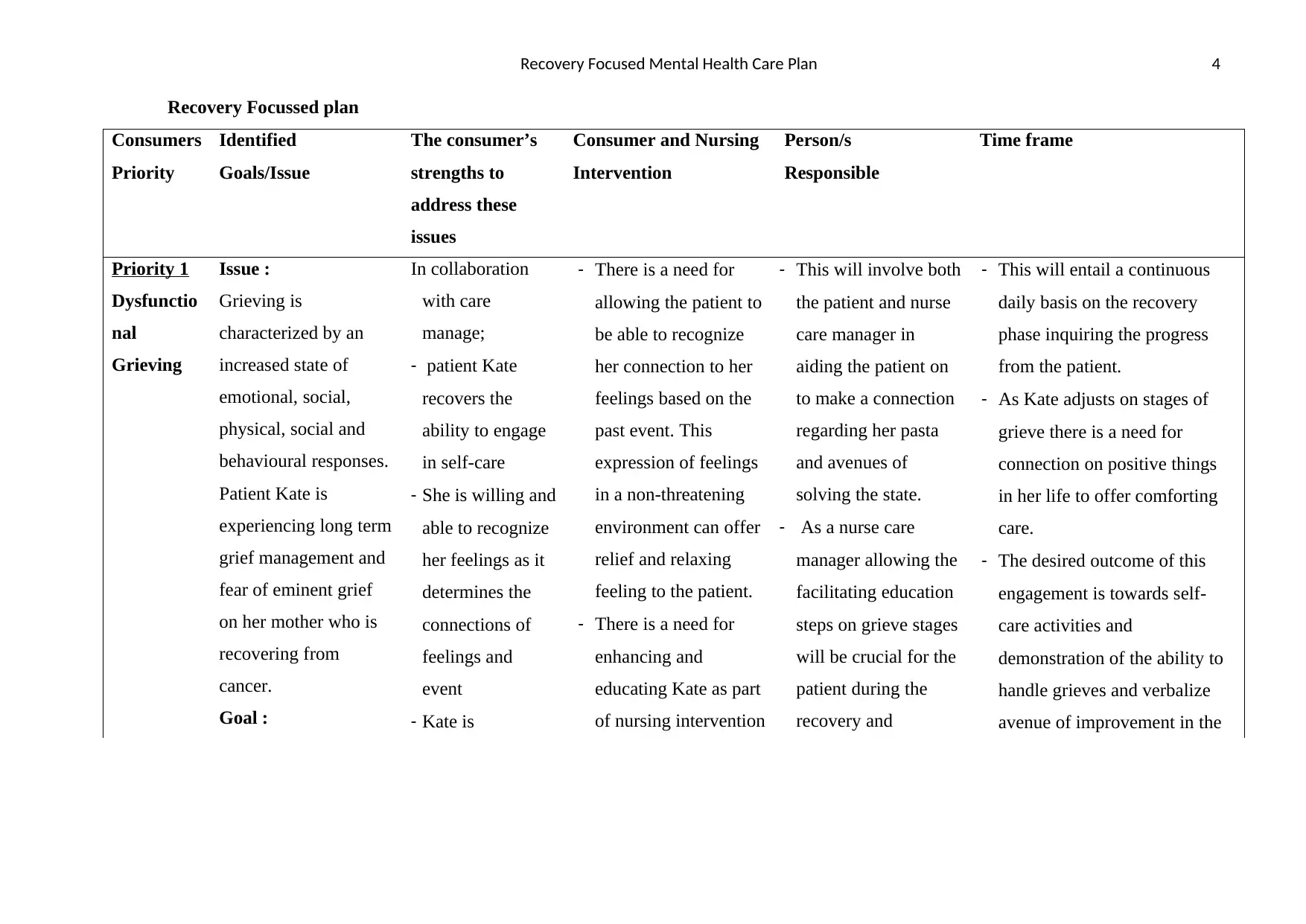
Recovery Focused Mental Health Care Plan 4
Recovery Focussed plan
Consumers
Priority
Identified
Goals/Issue
The consumer’s
strengths to
address these
issues
Consumer and Nursing
Intervention
Person/s
Responsible
Time frame
Priority 1
Dysfunctio
nal
Grieving
Issue :
Grieving is
characterized by an
increased state of
emotional, social,
physical, social and
behavioural responses.
Patient Kate is
experiencing long term
grief management and
fear of eminent grief
on her mother who is
recovering from
cancer.
Goal :
In collaboration
with care
manage;
- patient Kate
recovers the
ability to engage
in self-care
- She is willing and
able to recognize
her feelings as it
determines the
connections of
feelings and
event
- Kate is
- There is a need for
allowing the patient to
be able to recognize
her connection to her
feelings based on the
past event. This
expression of feelings
in a non-threatening
environment can offer
relief and relaxing
feeling to the patient.
- There is a need for
enhancing and
educating Kate as part
of nursing intervention
- This will involve both
the patient and nurse
care manager in
aiding the patient on
to make a connection
regarding her pasta
and avenues of
solving the state.
- As a nurse care
manager allowing the
facilitating education
steps on grieve stages
will be crucial for the
patient during the
recovery and
- This will entail a continuous
daily basis on the recovery
phase inquiring the progress
from the patient.
- As Kate adjusts on stages of
grieve there is a need for
connection on positive things
in her life to offer comforting
care.
- The desired outcome of this
engagement is towards self-
care activities and
demonstration of the ability to
handle grieves and verbalize
avenue of improvement in the
Recovery Focussed plan
Consumers
Priority
Identified
Goals/Issue
The consumer’s
strengths to
address these
issues
Consumer and Nursing
Intervention
Person/s
Responsible
Time frame
Priority 1
Dysfunctio
nal
Grieving
Issue :
Grieving is
characterized by an
increased state of
emotional, social,
physical, social and
behavioural responses.
Patient Kate is
experiencing long term
grief management and
fear of eminent grief
on her mother who is
recovering from
cancer.
Goal :
In collaboration
with care
manage;
- patient Kate
recovers the
ability to engage
in self-care
- She is willing and
able to recognize
her feelings as it
determines the
connections of
feelings and
event
- Kate is
- There is a need for
allowing the patient to
be able to recognize
her connection to her
feelings based on the
past event. This
expression of feelings
in a non-threatening
environment can offer
relief and relaxing
feeling to the patient.
- There is a need for
enhancing and
educating Kate as part
of nursing intervention
- This will involve both
the patient and nurse
care manager in
aiding the patient on
to make a connection
regarding her pasta
and avenues of
solving the state.
- As a nurse care
manager allowing the
facilitating education
steps on grieve stages
will be crucial for the
patient during the
recovery and
- This will entail a continuous
daily basis on the recovery
phase inquiring the progress
from the patient.
- As Kate adjusts on stages of
grieve there is a need for
connection on positive things
in her life to offer comforting
care.
- The desired outcome of this
engagement is towards self-
care activities and
demonstration of the ability to
handle grieves and verbalize
avenue of improvement in the
Paraphrase This Document
Need a fresh take? Get an instant paraphrase of this document with our AI Paraphraser
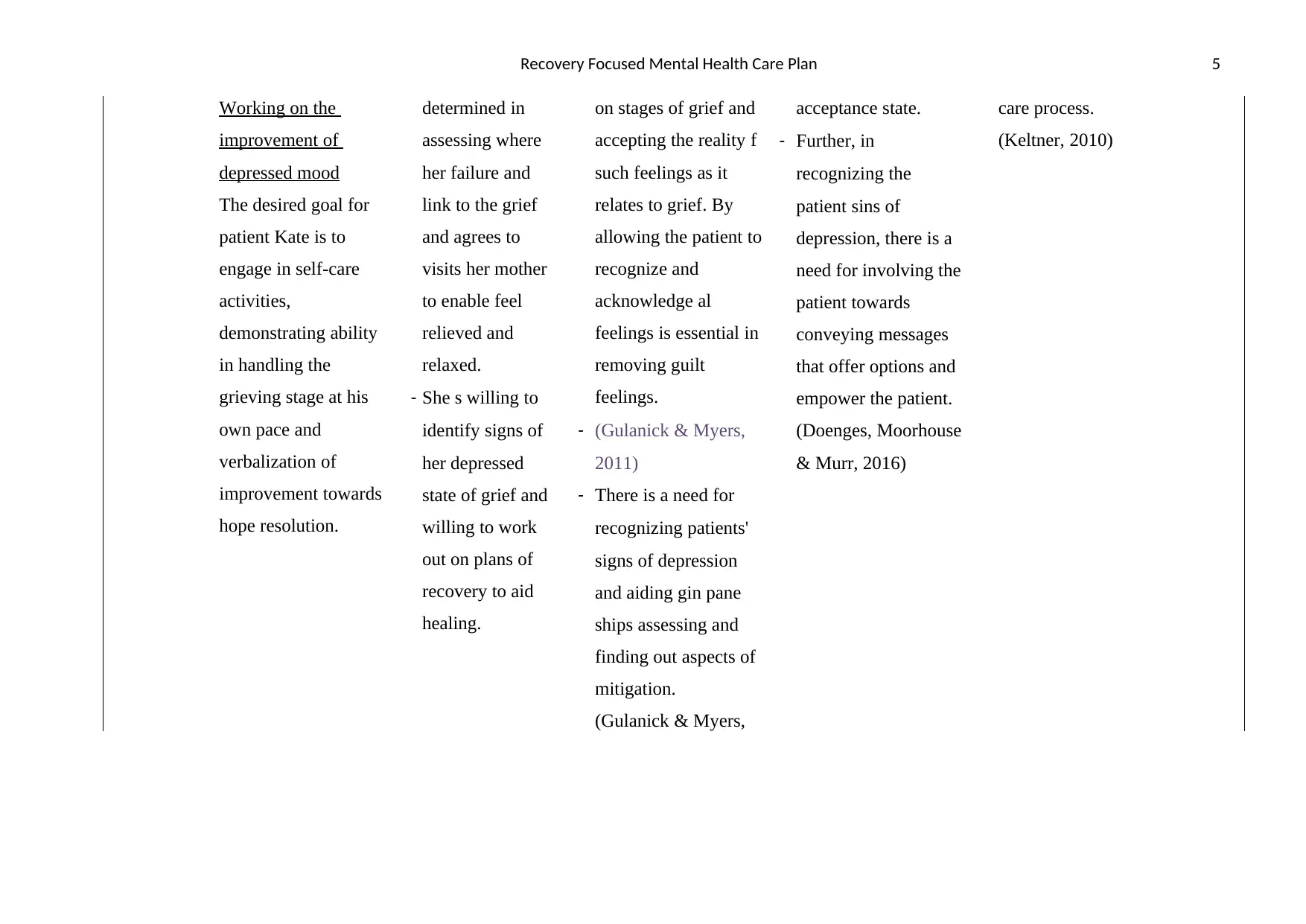
Recovery Focused Mental Health Care Plan 5
Working on the
improvement of
depressed mood
The desired goal for
patient Kate is to
engage in self-care
activities,
demonstrating ability
in handling the
grieving stage at his
own pace and
verbalization of
improvement towards
hope resolution.
determined in
assessing where
her failure and
link to the grief
and agrees to
visits her mother
to enable feel
relieved and
relaxed.
- She s willing to
identify signs of
her depressed
state of grief and
willing to work
out on plans of
recovery to aid
healing.
on stages of grief and
accepting the reality f
such feelings as it
relates to grief. By
allowing the patient to
recognize and
acknowledge al
feelings is essential in
removing guilt
feelings.
- (Gulanick & Myers,
2011)
- There is a need for
recognizing patients'
signs of depression
and aiding gin pane
ships assessing and
finding out aspects of
mitigation.
(Gulanick & Myers,
acceptance state.
- Further, in
recognizing the
patient sins of
depression, there is a
need for involving the
patient towards
conveying messages
that offer options and
empower the patient.
(Doenges, Moorhouse
& Murr, 2016)
care process.
(Keltner, 2010)
Working on the
improvement of
depressed mood
The desired goal for
patient Kate is to
engage in self-care
activities,
demonstrating ability
in handling the
grieving stage at his
own pace and
verbalization of
improvement towards
hope resolution.
determined in
assessing where
her failure and
link to the grief
and agrees to
visits her mother
to enable feel
relieved and
relaxed.
- She s willing to
identify signs of
her depressed
state of grief and
willing to work
out on plans of
recovery to aid
healing.
on stages of grief and
accepting the reality f
such feelings as it
relates to grief. By
allowing the patient to
recognize and
acknowledge al
feelings is essential in
removing guilt
feelings.
- (Gulanick & Myers,
2011)
- There is a need for
recognizing patients'
signs of depression
and aiding gin pane
ships assessing and
finding out aspects of
mitigation.
(Gulanick & Myers,
acceptance state.
- Further, in
recognizing the
patient sins of
depression, there is a
need for involving the
patient towards
conveying messages
that offer options and
empower the patient.
(Doenges, Moorhouse
& Murr, 2016)
care process.
(Keltner, 2010)
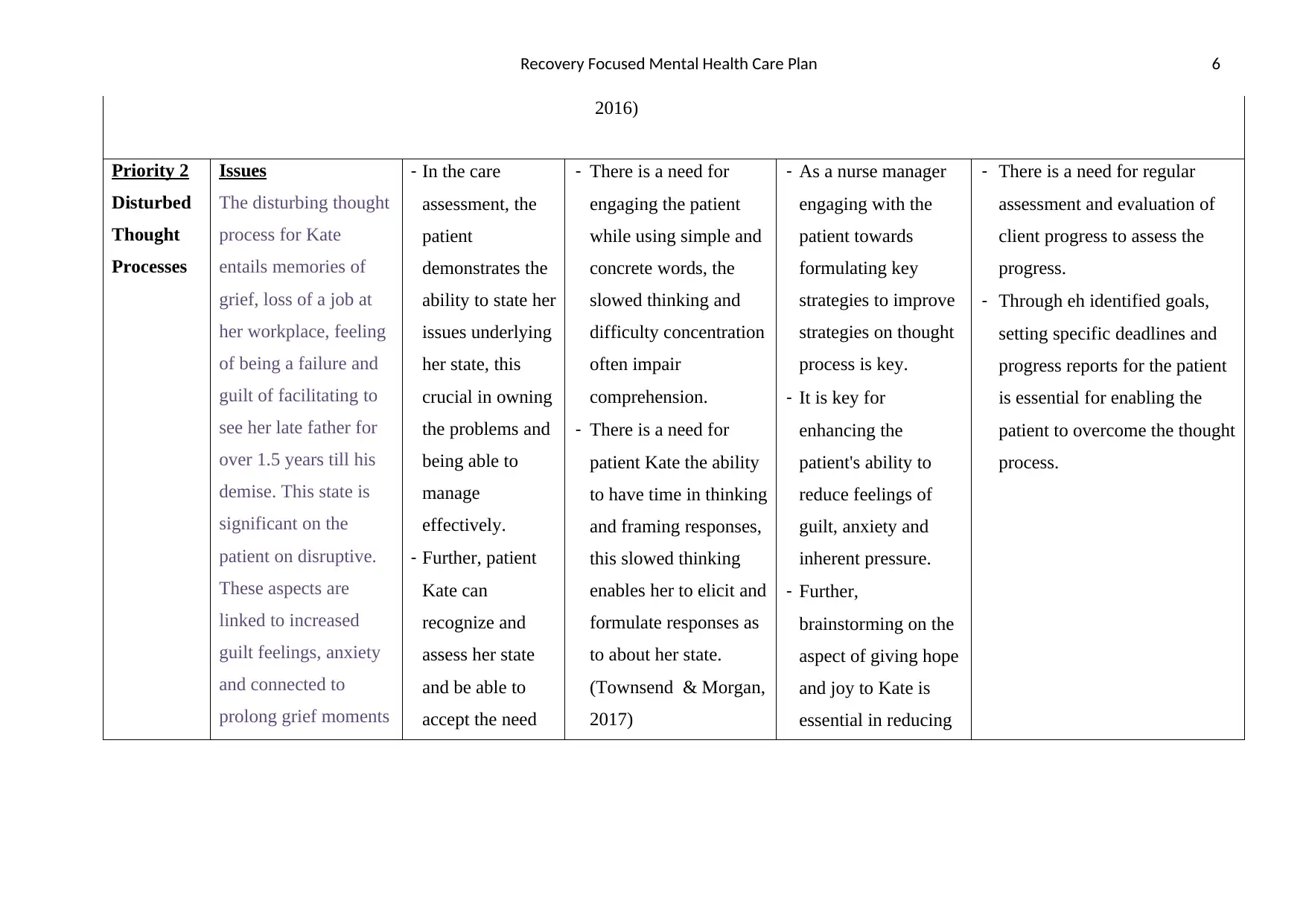
Recovery Focused Mental Health Care Plan 6
2016)
Priority 2
Disturbed
Thought
Processes
Issues
The disturbing thought
process for Kate
entails memories of
grief, loss of a job at
her workplace, feeling
of being a failure and
guilt of facilitating to
see her late father for
over 1.5 years till his
demise. This state is
significant on the
patient on disruptive.
These aspects are
linked to increased
guilt feelings, anxiety
and connected to
prolong grief moments
- In the care
assessment, the
patient
demonstrates the
ability to state her
issues underlying
her state, this
crucial in owning
the problems and
being able to
manage
effectively.
- Further, patient
Kate can
recognize and
assess her state
and be able to
accept the need
- There is a need for
engaging the patient
while using simple and
concrete words, the
slowed thinking and
difficulty concentration
often impair
comprehension.
- There is a need for
patient Kate the ability
to have time in thinking
and framing responses,
this slowed thinking
enables her to elicit and
formulate responses as
to about her state.
(Townsend & Morgan,
2017)
- As a nurse manager
engaging with the
patient towards
formulating key
strategies to improve
strategies on thought
process is key.
- It is key for
enhancing the
patient's ability to
reduce feelings of
guilt, anxiety and
inherent pressure.
- Further,
brainstorming on the
aspect of giving hope
and joy to Kate is
essential in reducing
- There is a need for regular
assessment and evaluation of
client progress to assess the
progress.
- Through eh identified goals,
setting specific deadlines and
progress reports for the patient
is essential for enabling the
patient to overcome the thought
process.
2016)
Priority 2
Disturbed
Thought
Processes
Issues
The disturbing thought
process for Kate
entails memories of
grief, loss of a job at
her workplace, feeling
of being a failure and
guilt of facilitating to
see her late father for
over 1.5 years till his
demise. This state is
significant on the
patient on disruptive.
These aspects are
linked to increased
guilt feelings, anxiety
and connected to
prolong grief moments
- In the care
assessment, the
patient
demonstrates the
ability to state her
issues underlying
her state, this
crucial in owning
the problems and
being able to
manage
effectively.
- Further, patient
Kate can
recognize and
assess her state
and be able to
accept the need
- There is a need for
engaging the patient
while using simple and
concrete words, the
slowed thinking and
difficulty concentration
often impair
comprehension.
- There is a need for
patient Kate the ability
to have time in thinking
and framing responses,
this slowed thinking
enables her to elicit and
formulate responses as
to about her state.
(Townsend & Morgan,
2017)
- As a nurse manager
engaging with the
patient towards
formulating key
strategies to improve
strategies on thought
process is key.
- It is key for
enhancing the
patient's ability to
reduce feelings of
guilt, anxiety and
inherent pressure.
- Further,
brainstorming on the
aspect of giving hope
and joy to Kate is
essential in reducing
- There is a need for regular
assessment and evaluation of
client progress to assess the
progress.
- Through eh identified goals,
setting specific deadlines and
progress reports for the patient
is essential for enabling the
patient to overcome the thought
process.
⊘ This is a preview!⊘
Do you want full access?
Subscribe today to unlock all pages.

Trusted by 1+ million students worldwide
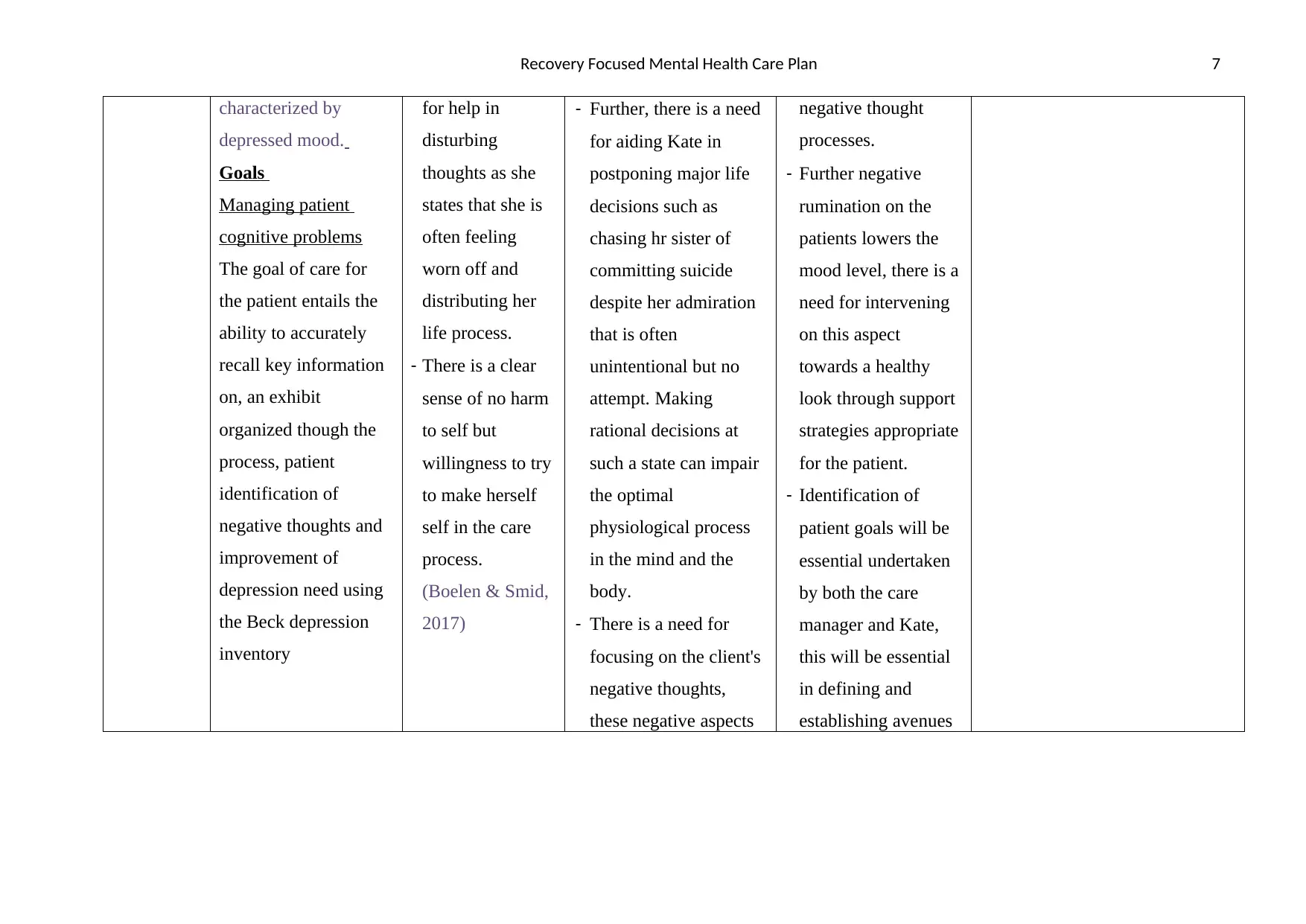
Recovery Focused Mental Health Care Plan 7
characterized by
depressed mood.
Goals
Managing patient
cognitive problems
The goal of care for
the patient entails the
ability to accurately
recall key information
on, an exhibit
organized though the
process, patient
identification of
negative thoughts and
improvement of
depression need using
the Beck depression
inventory
for help in
disturbing
thoughts as she
states that she is
often feeling
worn off and
distributing her
life process.
- There is a clear
sense of no harm
to self but
willingness to try
to make herself
self in the care
process.
(Boelen & Smid,
2017)
- Further, there is a need
for aiding Kate in
postponing major life
decisions such as
chasing hr sister of
committing suicide
despite her admiration
that is often
unintentional but no
attempt. Making
rational decisions at
such a state can impair
the optimal
physiological process
in the mind and the
body.
- There is a need for
focusing on the client's
negative thoughts,
these negative aspects
negative thought
processes.
- Further negative
rumination on the
patients lowers the
mood level, there is a
need for intervening
on this aspect
towards a healthy
look through support
strategies appropriate
for the patient.
- Identification of
patient goals will be
essential undertaken
by both the care
manager and Kate,
this will be essential
in defining and
establishing avenues
characterized by
depressed mood.
Goals
Managing patient
cognitive problems
The goal of care for
the patient entails the
ability to accurately
recall key information
on, an exhibit
organized though the
process, patient
identification of
negative thoughts and
improvement of
depression need using
the Beck depression
inventory
for help in
disturbing
thoughts as she
states that she is
often feeling
worn off and
distributing her
life process.
- There is a clear
sense of no harm
to self but
willingness to try
to make herself
self in the care
process.
(Boelen & Smid,
2017)
- Further, there is a need
for aiding Kate in
postponing major life
decisions such as
chasing hr sister of
committing suicide
despite her admiration
that is often
unintentional but no
attempt. Making
rational decisions at
such a state can impair
the optimal
physiological process
in the mind and the
body.
- There is a need for
focusing on the client's
negative thoughts,
these negative aspects
negative thought
processes.
- Further negative
rumination on the
patients lowers the
mood level, there is a
need for intervening
on this aspect
towards a healthy
look through support
strategies appropriate
for the patient.
- Identification of
patient goals will be
essential undertaken
by both the care
manager and Kate,
this will be essential
in defining and
establishing avenues
Paraphrase This Document
Need a fresh take? Get an instant paraphrase of this document with our AI Paraphraser
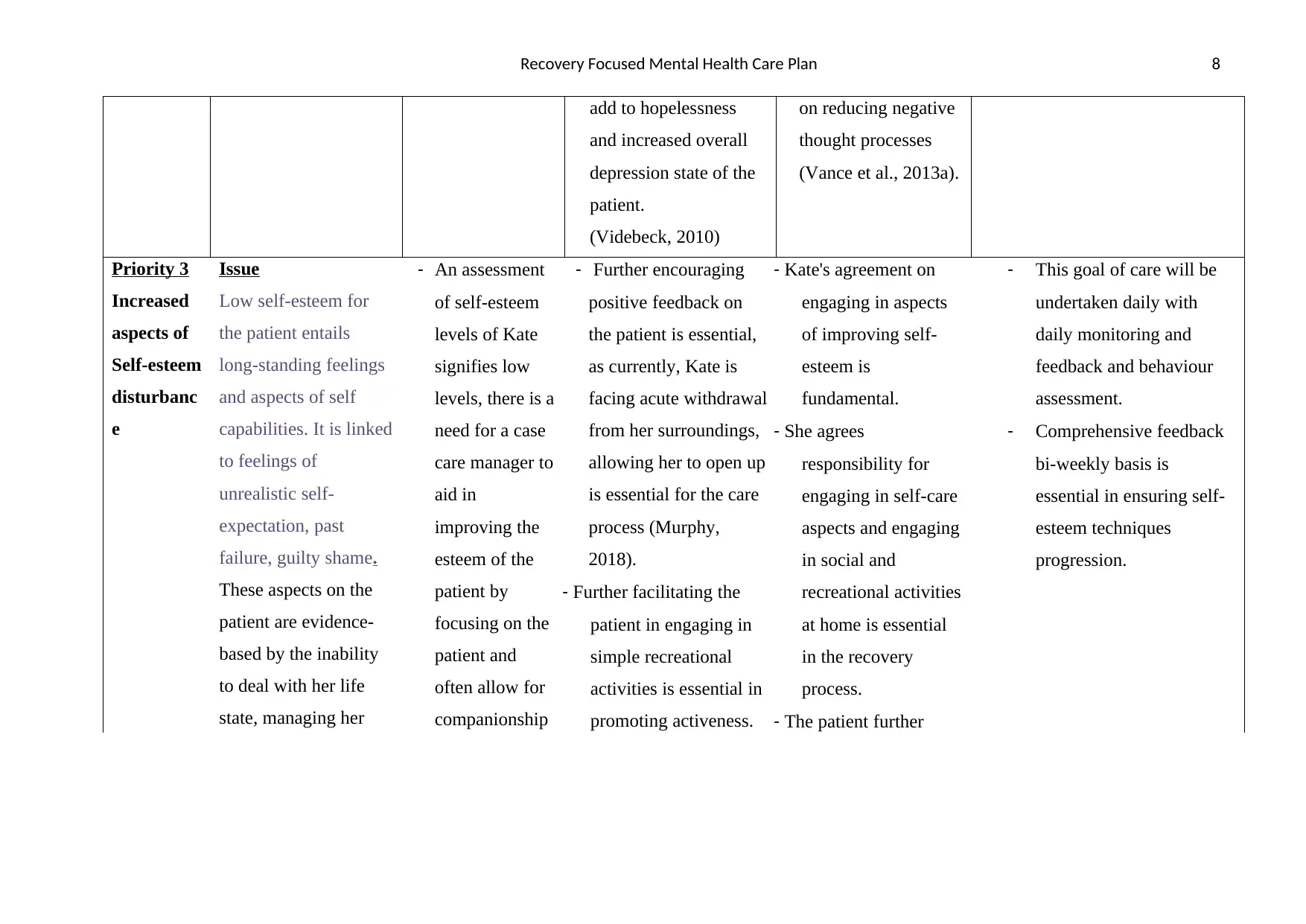
Recovery Focused Mental Health Care Plan 8
add to hopelessness
and increased overall
depression state of the
patient.
(Videbeck, 2010)
on reducing negative
thought processes
(Vance et al., 2013a).
Priority 3
Increased
aspects of
Self-esteem
disturbanc
e
Issue
Low self-esteem for
the patient entails
long-standing feelings
and aspects of self
capabilities. It is linked
to feelings of
unrealistic self-
expectation, past
failure, guilty shame.
These aspects on the
patient are evidence-
based by the inability
to deal with her life
state, managing her
- An assessment
of self-esteem
levels of Kate
signifies low
levels, there is a
need for a case
care manager to
aid in
improving the
esteem of the
patient by
focusing on the
patient and
often allow for
companionship
- Further encouraging
positive feedback on
the patient is essential,
as currently, Kate is
facing acute withdrawal
from her surroundings,
allowing her to open up
is essential for the care
process (Murphy,
2018).
- Further facilitating the
patient in engaging in
simple recreational
activities is essential in
promoting activeness.
- Kate's agreement on
engaging in aspects
of improving self-
esteem is
fundamental.
- She agrees
responsibility for
engaging in self-care
aspects and engaging
in social and
recreational activities
at home is essential
in the recovery
process.
- The patient further
- This goal of care will be
undertaken daily with
daily monitoring and
feedback and behaviour
assessment.
- Comprehensive feedback
bi-weekly basis is
essential in ensuring self-
esteem techniques
progression.
add to hopelessness
and increased overall
depression state of the
patient.
(Videbeck, 2010)
on reducing negative
thought processes
(Vance et al., 2013a).
Priority 3
Increased
aspects of
Self-esteem
disturbanc
e
Issue
Low self-esteem for
the patient entails
long-standing feelings
and aspects of self
capabilities. It is linked
to feelings of
unrealistic self-
expectation, past
failure, guilty shame.
These aspects on the
patient are evidence-
based by the inability
to deal with her life
state, managing her
- An assessment
of self-esteem
levels of Kate
signifies low
levels, there is a
need for a case
care manager to
aid in
improving the
esteem of the
patient by
focusing on the
patient and
often allow for
companionship
- Further encouraging
positive feedback on
the patient is essential,
as currently, Kate is
facing acute withdrawal
from her surroundings,
allowing her to open up
is essential for the care
process (Murphy,
2018).
- Further facilitating the
patient in engaging in
simple recreational
activities is essential in
promoting activeness.
- Kate's agreement on
engaging in aspects
of improving self-
esteem is
fundamental.
- She agrees
responsibility for
engaging in self-care
aspects and engaging
in social and
recreational activities
at home is essential
in the recovery
process.
- The patient further
- This goal of care will be
undertaken daily with
daily monitoring and
feedback and behaviour
assessment.
- Comprehensive feedback
bi-weekly basis is
essential in ensuring self-
esteem techniques
progression.
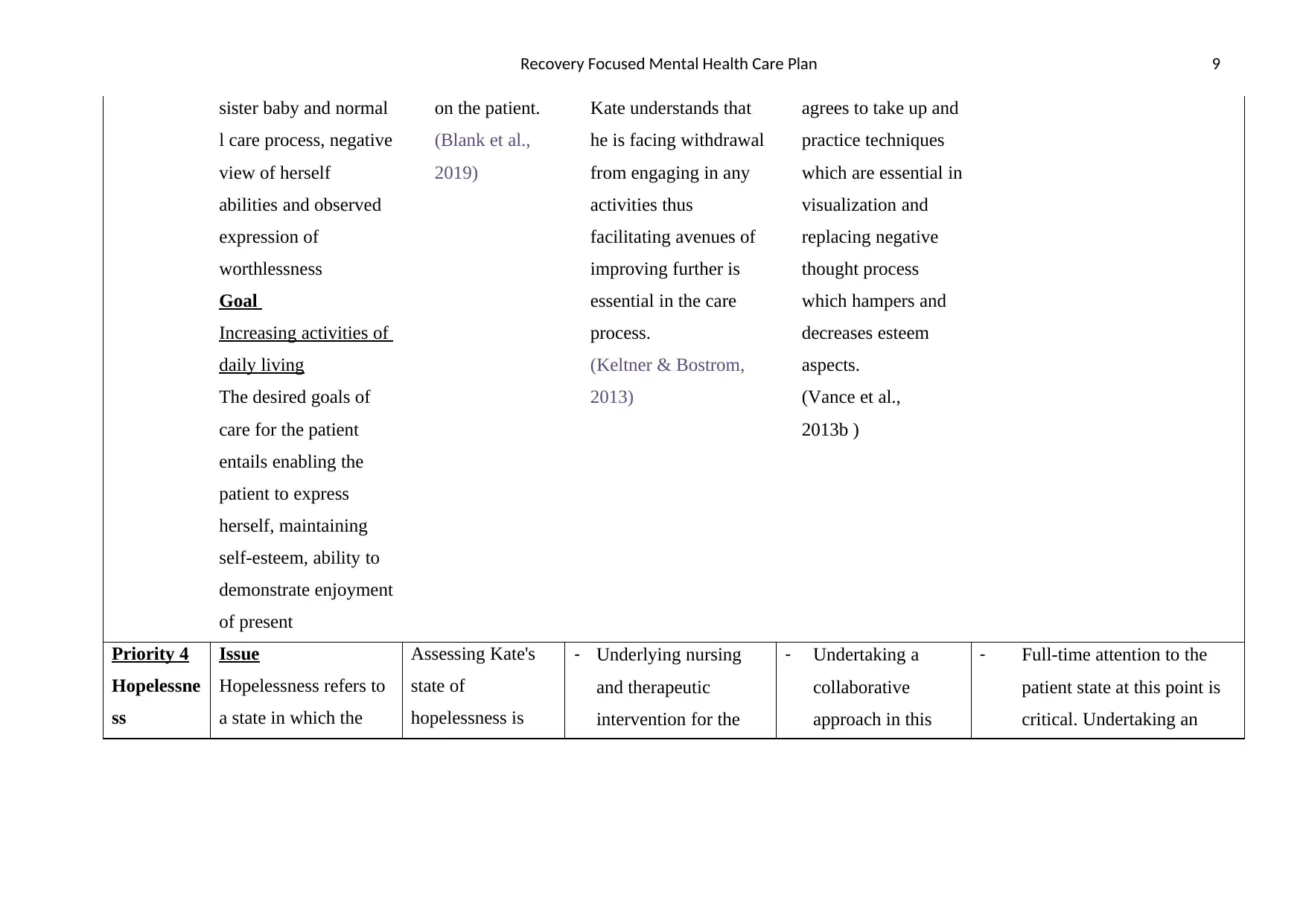
Recovery Focused Mental Health Care Plan 9
sister baby and normal
l care process, negative
view of herself
abilities and observed
expression of
worthlessness
Goal
Increasing activities of
daily living
The desired goals of
care for the patient
entails enabling the
patient to express
herself, maintaining
self-esteem, ability to
demonstrate enjoyment
of present
on the patient.
(Blank et al.,
2019)
Kate understands that
he is facing withdrawal
from engaging in any
activities thus
facilitating avenues of
improving further is
essential in the care
process.
(Keltner & Bostrom,
2013)
agrees to take up and
practice techniques
which are essential in
visualization and
replacing negative
thought process
which hampers and
decreases esteem
aspects.
(Vance et al.,
2013b )
Priority 4
Hopelessne
ss
Issue
Hopelessness refers to
a state in which the
Assessing Kate's
state of
hopelessness is
- Underlying nursing
and therapeutic
intervention for the
- Undertaking a
collaborative
approach in this
- Full-time attention to the
patient state at this point is
critical. Undertaking an
sister baby and normal
l care process, negative
view of herself
abilities and observed
expression of
worthlessness
Goal
Increasing activities of
daily living
The desired goals of
care for the patient
entails enabling the
patient to express
herself, maintaining
self-esteem, ability to
demonstrate enjoyment
of present
on the patient.
(Blank et al.,
2019)
Kate understands that
he is facing withdrawal
from engaging in any
activities thus
facilitating avenues of
improving further is
essential in the care
process.
(Keltner & Bostrom,
2013)
agrees to take up and
practice techniques
which are essential in
visualization and
replacing negative
thought process
which hampers and
decreases esteem
aspects.
(Vance et al.,
2013b )
Priority 4
Hopelessne
ss
Issue
Hopelessness refers to
a state in which the
Assessing Kate's
state of
hopelessness is
- Underlying nursing
and therapeutic
intervention for the
- Undertaking a
collaborative
approach in this
- Full-time attention to the
patient state at this point is
critical. Undertaking an
⊘ This is a preview!⊘
Do you want full access?
Subscribe today to unlock all pages.

Trusted by 1+ million students worldwide
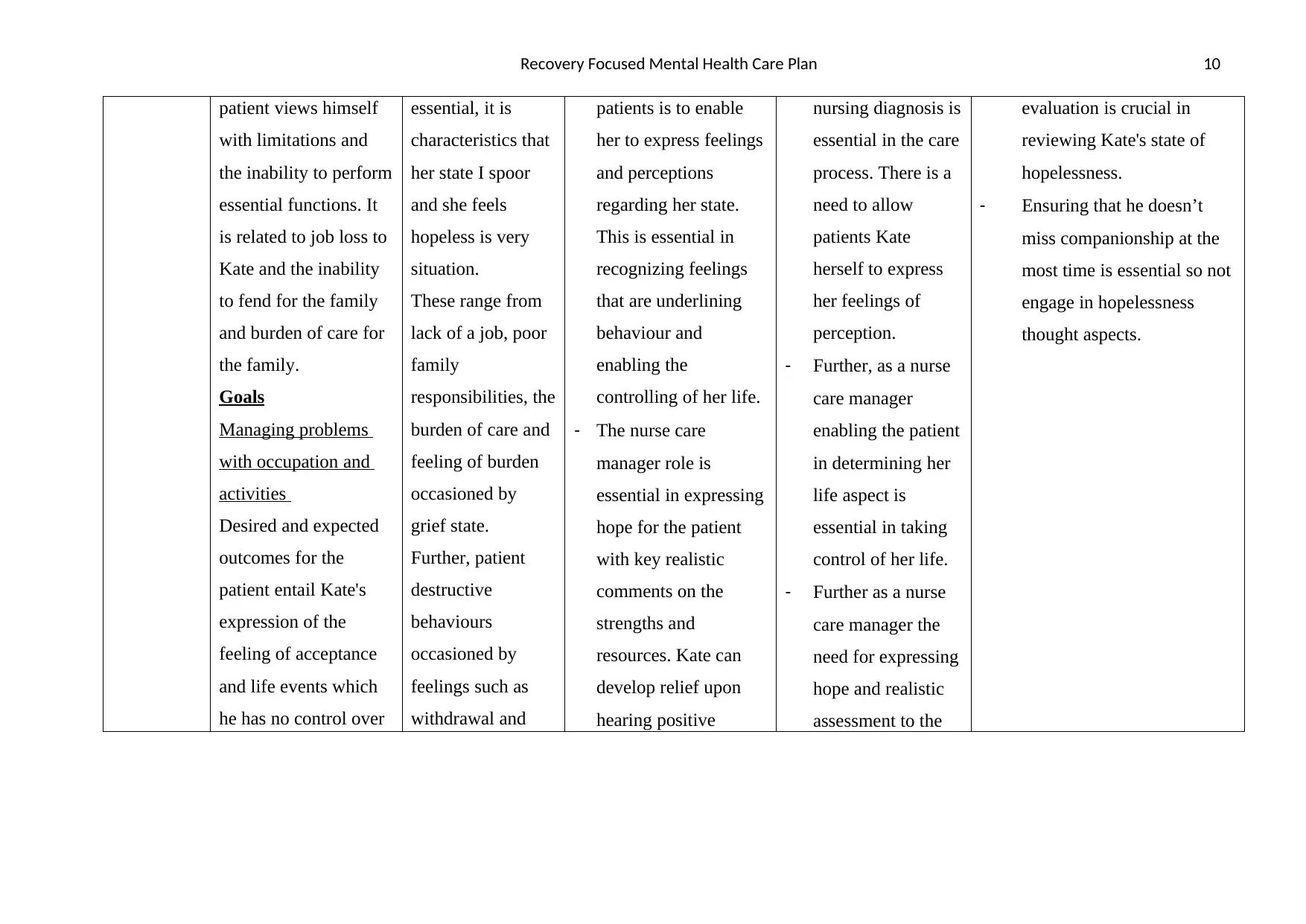
Recovery Focused Mental Health Care Plan 10
patient views himself
with limitations and
the inability to perform
essential functions. It
is related to job loss to
Kate and the inability
to fend for the family
and burden of care for
the family.
Goals
Managing problems
with occupation and
activities
Desired and expected
outcomes for the
patient entail Kate's
expression of the
feeling of acceptance
and life events which
he has no control over
essential, it is
characteristics that
her state I spoor
and she feels
hopeless is very
situation.
These range from
lack of a job, poor
family
responsibilities, the
burden of care and
feeling of burden
occasioned by
grief state.
Further, patient
destructive
behaviours
occasioned by
feelings such as
withdrawal and
patients is to enable
her to express feelings
and perceptions
regarding her state.
This is essential in
recognizing feelings
that are underlining
behaviour and
enabling the
controlling of her life.
- The nurse care
manager role is
essential in expressing
hope for the patient
with key realistic
comments on the
strengths and
resources. Kate can
develop relief upon
hearing positive
nursing diagnosis is
essential in the care
process. There is a
need to allow
patients Kate
herself to express
her feelings of
perception.
- Further, as a nurse
care manager
enabling the patient
in determining her
life aspect is
essential in taking
control of her life.
- Further as a nurse
care manager the
need for expressing
hope and realistic
assessment to the
evaluation is crucial in
reviewing Kate's state of
hopelessness.
- Ensuring that he doesn’t
miss companionship at the
most time is essential so not
engage in hopelessness
thought aspects.
patient views himself
with limitations and
the inability to perform
essential functions. It
is related to job loss to
Kate and the inability
to fend for the family
and burden of care for
the family.
Goals
Managing problems
with occupation and
activities
Desired and expected
outcomes for the
patient entail Kate's
expression of the
feeling of acceptance
and life events which
he has no control over
essential, it is
characteristics that
her state I spoor
and she feels
hopeless is very
situation.
These range from
lack of a job, poor
family
responsibilities, the
burden of care and
feeling of burden
occasioned by
grief state.
Further, patient
destructive
behaviours
occasioned by
feelings such as
withdrawal and
patients is to enable
her to express feelings
and perceptions
regarding her state.
This is essential in
recognizing feelings
that are underlining
behaviour and
enabling the
controlling of her life.
- The nurse care
manager role is
essential in expressing
hope for the patient
with key realistic
comments on the
strengths and
resources. Kate can
develop relief upon
hearing positive
nursing diagnosis is
essential in the care
process. There is a
need to allow
patients Kate
herself to express
her feelings of
perception.
- Further, as a nurse
care manager
enabling the patient
in determining her
life aspect is
essential in taking
control of her life.
- Further as a nurse
care manager the
need for expressing
hope and realistic
assessment to the
evaluation is crucial in
reviewing Kate's state of
hopelessness.
- Ensuring that he doesn’t
miss companionship at the
most time is essential so not
engage in hopelessness
thought aspects.
Paraphrase This Document
Need a fresh take? Get an instant paraphrase of this document with our AI Paraphraser
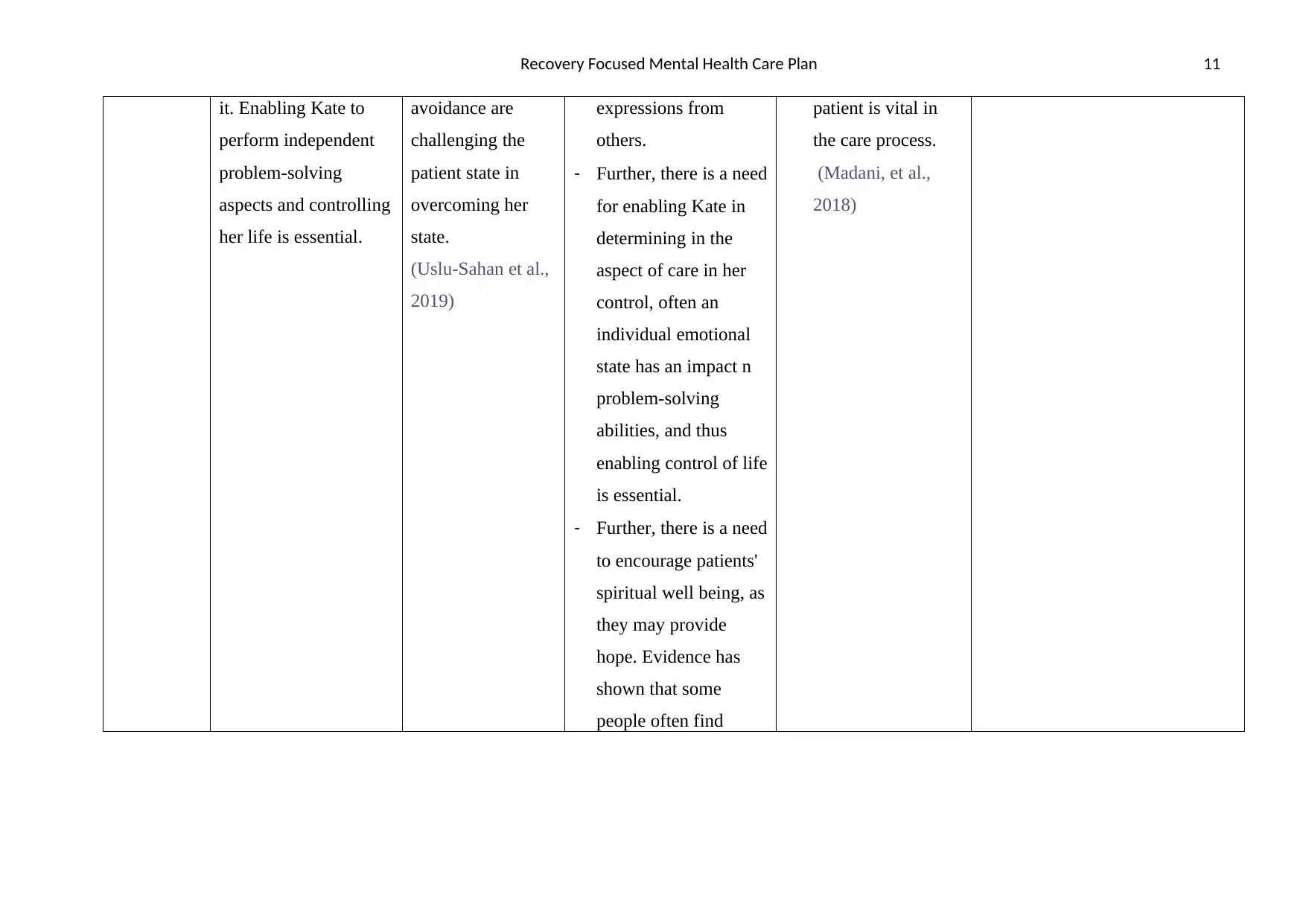
Recovery Focused Mental Health Care Plan 11
it. Enabling Kate to
perform independent
problem-solving
aspects and controlling
her life is essential.
avoidance are
challenging the
patient state in
overcoming her
state.
(Uslu-Sahan et al.,
2019)
expressions from
others.
- Further, there is a need
for enabling Kate in
determining in the
aspect of care in her
control, often an
individual emotional
state has an impact n
problem-solving
abilities, and thus
enabling control of life
is essential.
- Further, there is a need
to encourage patients'
spiritual well being, as
they may provide
hope. Evidence has
shown that some
people often find
patient is vital in
the care process.
(Madani, et al.,
2018)
it. Enabling Kate to
perform independent
problem-solving
aspects and controlling
her life is essential.
avoidance are
challenging the
patient state in
overcoming her
state.
(Uslu-Sahan et al.,
2019)
expressions from
others.
- Further, there is a need
for enabling Kate in
determining in the
aspect of care in her
control, often an
individual emotional
state has an impact n
problem-solving
abilities, and thus
enabling control of life
is essential.
- Further, there is a need
to encourage patients'
spiritual well being, as
they may provide
hope. Evidence has
shown that some
people often find
patient is vital in
the care process.
(Madani, et al.,
2018)
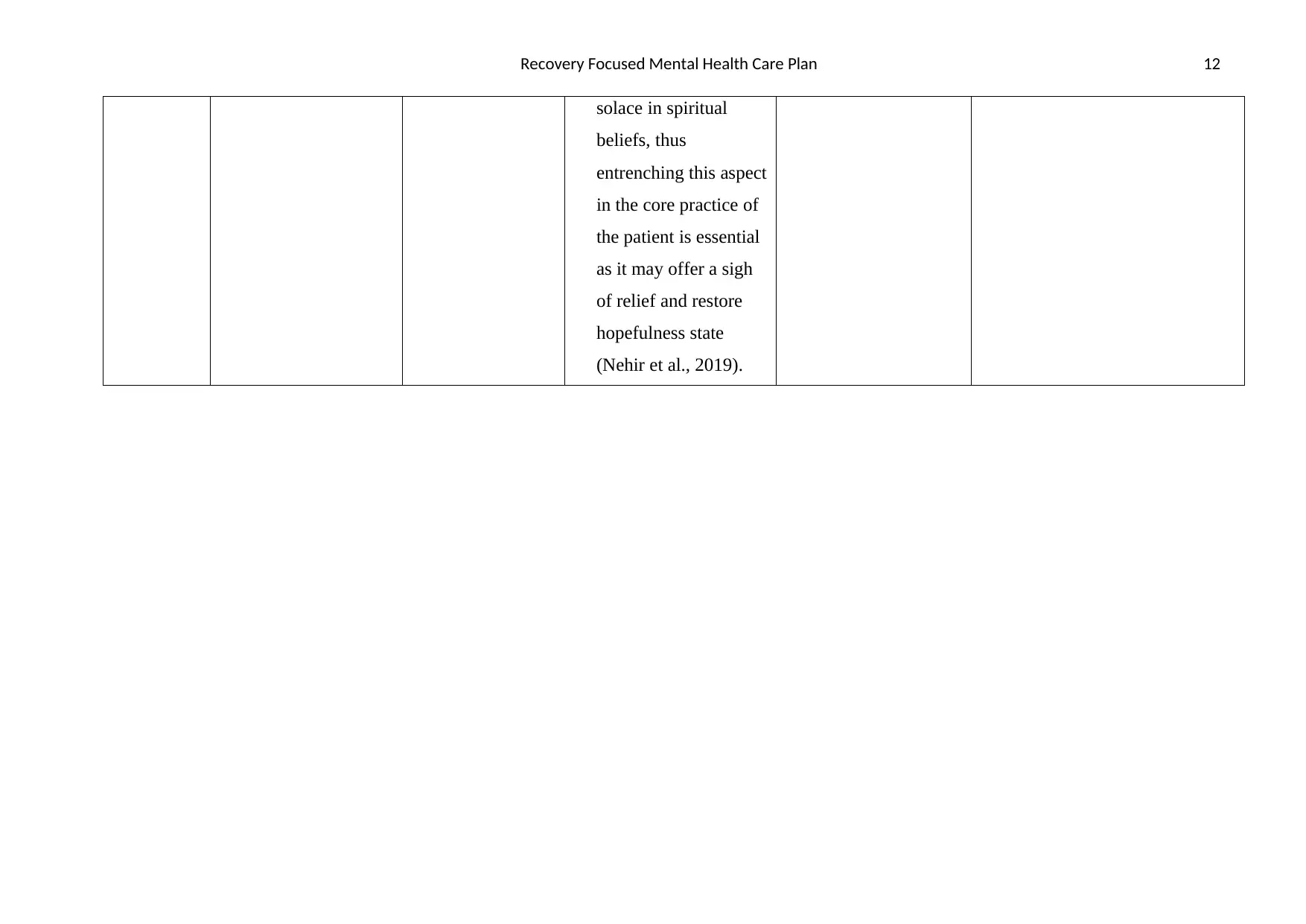
Recovery Focused Mental Health Care Plan 12
solace in spiritual
beliefs, thus
entrenching this aspect
in the core practice of
the patient is essential
as it may offer a sigh
of relief and restore
hopefulness state
(Nehir et al., 2019).
solace in spiritual
beliefs, thus
entrenching this aspect
in the core practice of
the patient is essential
as it may offer a sigh
of relief and restore
hopefulness state
(Nehir et al., 2019).
⊘ This is a preview!⊘
Do you want full access?
Subscribe today to unlock all pages.

Trusted by 1+ million students worldwide
1 out of 14
Related Documents
Your All-in-One AI-Powered Toolkit for Academic Success.
+13062052269
info@desklib.com
Available 24*7 on WhatsApp / Email
![[object Object]](/_next/static/media/star-bottom.7253800d.svg)
Unlock your academic potential
Copyright © 2020–2026 A2Z Services. All Rights Reserved. Developed and managed by ZUCOL.





